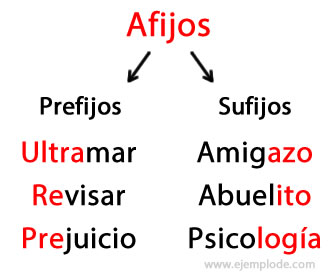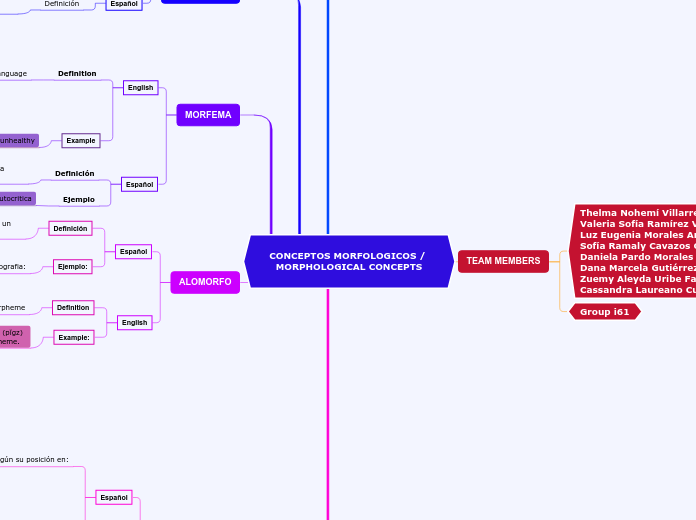CONCEPTOS MORFOLOGICOS / MORPHOLOGICAL CONCEPTS
GRAMATICA
Español
¿Qué es?
Es una parte de la linguistica
¿Qué estudia?
La estructura de las palabras y sus accidentes
La manera en que se combinan para formar oraciones
Se divide en:
GRAMATICA ESTRUCTURAL
Estudia:
La lengua enfocado en las relaciones que se establecen entre todos sus elementos, así como en todos sus niveles de realización.
Ejemplo:
Significante á-r-b-o-l Significado árbol
GRAMATICA DESCRIPTIVA
Se enfoca en:
Describir la manera en que los hablantes usan el idioma a diario.
Ejemplos:
Decir “Estoy muerto/a” para expresar cansancio.
Incluye:
Un conjunto de reglas sobre el lenguaje
Basadas en:
Cómo se usa en realidad, no cómo debería usarse.
GRAMATICA PRESCRIPTIVA
¿De que se ocupa?
Del establecimiento de normas de uso correcto e incorrecto y la formulación de reglas basadas en estas normas que deben seguir los usuarios del idioma.
Ejemplos:
Agregar letras que no van, como la letra “s” en las frases: “¿Qué hicistes?” o “¿vistes eso?”
English
Definition:
The whole system and structure of a language or of languages in general
Charachterisitc:
It is usually taken as consisting of syntax and morphology (including inflections) and sometimes also phonology and semantics.
It is divided into:
STRUCTURAL GRAMMAR
Definition:
It is concerned with how elements of a sentence such as morphemes, phonemes, phrases, clauses and parts of speech are put together.
Example:
Signifier t-r-e-e Meaning tree
DESCRIPTIVE GRAMMAR
Definition:
These are a set of rules about language based on how it is actually used
Characteristic:
In a descriptive grammar there is no right or wrong language
Example:
Saying “I am younger than him”, when the correct way would be “I am younger than he.”
PRESCRIPTIVE GRAMMAR
Definition:
This is the traditional approach of grammar. It is a set of rules based on how people think language should be used.
Examples:
Using “The woman whom I met looked sick” instead of saying “The woman who I met looked sick”
Saying “to go boldly” instead of “to boldly go”, because speakers shouldn’t split infinitives.
MORFOLOGÍA
English
Definition:
The study of the internal structure of words
Español
Definición
La parte de la gramática que se ocupa de la formación de las palabras
MORFEMA
English
Definition
Is a short segment of language
This meets three criteria:
1) It is a word or a part of a word that has meaning
2) It cannot be divided into smaller meaningful parts without violation of its meaning or without meaningless remainders.
3) It returns in differing verbal environments with a relatively stable meaning.
Example
unhealthy
Español
Definición
La unidad básica a que se tiene que llegar a través del análisis morfológico
Ejemplo
Autocritica
ALOMORFO
Español
Definición
Variantes que pueda tener un morfema en la lengua
Ejemplo:
La cuestion de ortografia:
En el morfema /-iero/ de muchos verbos, el cual normalmente se escribe con ‘i’ (Vend/-iero/n, sal/-iero/n), pero también existe con ‘y’ (le/-yero/n, o/-yero/n)
English
Definition
Any of the variant forms of a morpheme
Example:
The phonetic (s) of cats (kăts), (z) of pigs (pĭgz) are allomorphs of the English plural morpheme.
AFIJOS / AFIXES
Español
Se dividen según su posición en:
PREFIJOS
¿Que son?
Es el morfema (unidad mínima de significado) que se antepone a la raíz de una palabra.
SUFIXOS
¿Que son?
Afijo que se añade al final de la raíz de una palabra
Se divide en:
INFLEXIONALES
Caracteristicas:
No alteran el significado básico de la palabra
No cambia la parte de la oración a la que pertenence
Ejemplos:
Libro ---> libros (ambos sustantivos, sólo se agrega la noción de plural
DERIVACIONALES
Caracteristica:
Modifican el significado central de la palabra
Ejemplos:
form- (raíz inseparable o base) y reform- (base que consta de dos morfemas)
Ejemplos:

English
Definition:
They are a bound morpheme that occurs before or within or after a base.
There are three kinds:
PREFIXES
Definitions:
1. These are those bound morphemes that occur before a base
2. Is a letter or a group of letters that we add to the beginning of a word
Examples
The prefix un- (or u-n) can mean "not," "remove," or "opposite.
INFIXES
Definition:
These are bound morphemes that have been inserted within a word
Examples
ee- in geese, replacing the -oo- of goose
SUFFIXES
Definition:
These are bound morphemes that occur after a base
These are divided in:
INFLECTIONAL SUFIXES
Characteristics
1. They no not change the part of speech
2. They come last in a word
3. They go with all stems of a given part of a speech
4. They do not pile up; only one ends a word.
Example:
-cough, -coughed ( both verbs)
DERIVATIONAL SUFIXES
Characteristics
1. The words with which derivational suffixes combine is an arbitrary matter
2. They changes the part of speech of the word to which it is added
3. They usually do not close off a word; that is, after a derivational suffix and can frequently add an inflectional suffix
Examples:
act (as a verb)---> active (adjective)
TEAM MEMBERS
Thelma Nohemí Villarreal Lozano
Valeria Sofía Ramírez Villarreal 1925901
Luz Eugenia Morales Aranda 1866569
Sofía Ramaly Cavazos González - 1899553
Daniela Pardo Morales 1930487
Dana Marcela Gutiérrez Ramírez 1862199
Zuemy Aleyda Uribe Fajardo 1810122
Cassandra Laureano Cuellar 1931751
Group i61
